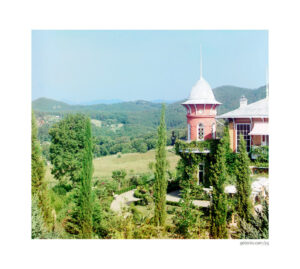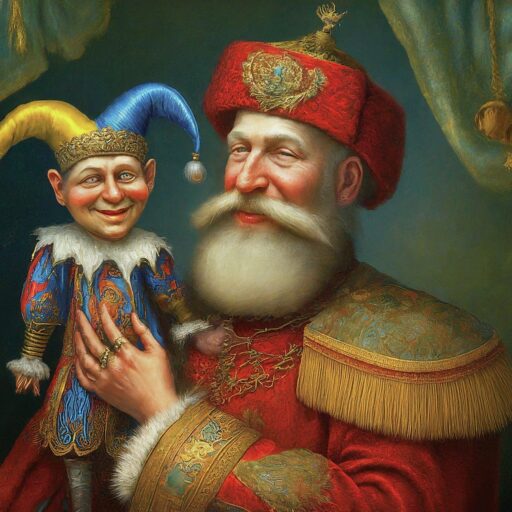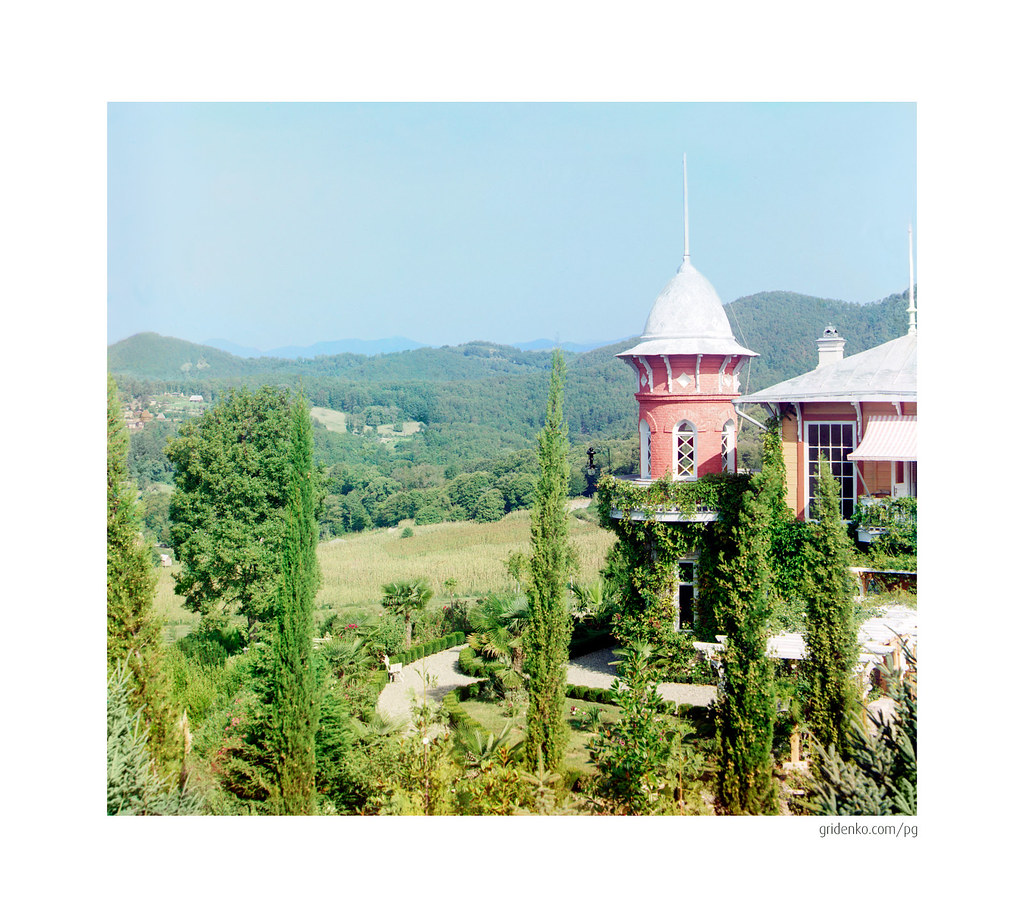The Kremlin, Moscow
The president of Russia is happier than he can remember ever being. He is sometimes still nagged and bedeviled by the memories of growing up in a cold-water, concrete, Leningrad high-rise where his family shared a communal bathroom and were forced to heat their water to bathe over a single-burner stove that they shared with four other families and washed themselves over the toilet in the bathroom that they likewise shared, and where temperatures in the stairwells in the bitter Russian winters were sometimes below freezing. Even with that, given the general conditions in Leningrad following the war, they were—compared to other poor Russians—relatively well off.

Thankfully, those days are gone forever for the Russian president. Though there is no official reporting or accounting of his wealth, he is reckoned by knowledgeable sources to be one of the richest people on the planet with some estimates of his personal fortune going as high as 200 billion dollars. He lives in the sumptuous Kremlin palace, has a dacha in the country outside Moscow, and a palatial, villa-style estate in the Crimea.
But it is not the money that gives him the most satisfaction. His principal source of pride comes from the belief that he is fulfilling his long-held dream of restoring the power and glory of Mother Russia on the world stage after the collapse of the Soviet system and the follow-on humiliations of the Yeltsin era. The president of Russia now has at his command the method and the means to accomplish his strategic geopolitical goals (the method being the Soviet-style, cold war orthodoxy of confronting the U.S. at every turn, the means being the assistance, indeed, the willing and active connivance of the U.S. president as his useful idiot in destroying the NATO alliance and the EU, disrupting western democracies, and seizing back territory lost in the collapse and dismemberment of the old Soviet Union.
In 2014, when he sent Russian troops into the Crimea, Tsar Peter justified the action with the claim that he was protecting the Russian-speaking population in the Donbas region that represented about seven percent of the Ukraine, an area about the size of Texas in the United States. This was the same rationale used by Adolph Hitler when he sent German soldiers (Nazis) into the Sudetenland in Czechoslovakia prior to invading Poland in September 1939. Tsar Peter’s evil intentions in the region were solidified when a Malaysian passenger jetliner was shot down, killing more than 300 people, by a Russian anti-aircraft missile made in Moscow.
The Russian president compliments himself that he now personally controls the morally compromised U.S. president with the video of the sexually depraved Bad King cavorting with under-aged girls. He relishes the power it gives him to re-shape the Western alliance (what current hagiographers call the “free world”) and use for his purposes a financially compromised—through the judicious use of bribes and illegal campaign contributions funneled through the NRA—majority of Republicans, plus an odd handful of red-state Democrats, in the U.S. Senate. At the Russian president’s insistence, the U.S. president has recently bullied the Congress of the United States into lifting the onerous sanctions on him and his oligarch cronies. They will now be able to access and use the international banking system to aid them in their kleptocratic exploitation of their country’s natural resource base and the illegal money laundering that allows them to more fully enjoy and profit from their ill-gotten gains. Tsar Peter is happy that he will now be able to leverage the strength and power of the U.S. economy to the benefit of himself, his oligarch cronies, and Mother Russia.
He remembers how as an impressionable fifteen-year-old youth he was inspired by a popular Soviet miniseries called The Shield and the Sword. Created from a best-selling novel by the same name, it glamorized the life of a Soviet intelligence officer working in Germany. He now recalls—more than fifty years later, with some wistfulness—how the book and the miniseries influenced him to become a Soviet KGB agent. He then reflects how in 2010 when eleven illegals, Russian agents uncovered in the United States, were deported, and returned to Russia. Always the astute politician, for the propaganda minded Russian president it was an opportunity not to be missed, the chance to bask in the patriotic limelight, and he proudly stood on stage and sang with them—as a celebratory salute to the returning heroes—The Sword and the Shield theme song from the miniseries.
He is now sixty-seven years old. Earlier that evening he had by-passed his usual mistress and instead used a girl from one of the intelligence branches. This is one of the personal perks the president of Russia enjoys. She is just twenty years old, from a small Russian hamlet on the western edge of Siberia. Ostensibly she is a student at the university in Moscow, but she has been carefully chosen by the SVR (the Russian foreign intelligence service) for her looks and intelligence to be trained as a Russian operative who will later be used to spy in America. Her English is flawless—in an Americanized way—and she has already spent a year as a student in international studies at Georgetown in Washington.
He acknowledges to himself that the girl is stunning, with shapely long legs, firm full breasts, and a perfectly modeled figure. And he makes a note to himself that he will have her again. She even acquiesced when he demanded anal sex. Though she gritted her teeth through the whole thing, she did allow when it was over that it had not been so bad. At the end, she even complimented the president on his sexual prowess, hoping it would help advance her career at the SVR. After all, how many other young women her age can say they have been with the most (disallowing, as he deserved to be disallowed, the U.S. president) powerful man in the world.
But the president of Russia does not allow the compliment to go to his head. These young women are, after all, trained how to flatter and manipulate the egos of powerful men. He understands that such training is necessary if they are later to be effective out in the field.
Tsar Peter, however, in his relationship with The Bad King, considers that he (not the U.S. president) is the most powerful man on the face of the earth. He thinks again of the girl. He will call the head of the SVR tomorrow and see that she is promoted up the ranks, rewarded for her selfless service to her president and Mother Russia.
He prides himself again that he is now the most powerful head of state in the world. Just so long as he maintains his hold over the compromised president of the United States, the U.S. is no longer the dominant world power. His foreign policy achievements have already increased immensely his popularity with the Russian people. He is restoring to the whole of Russia a burgeoning sense of pride with a recapture of lost territory, what he calls Novorossiya (New Russia), after the humiliation of the collapse of the Soviet Union, brought about by weak leaders like Gorbachev and his early patron, the man to whom he owes his current position, the drunken and decrepit Boris Yeltsin. The 2014 Sochi Winter Olympic games, after all, restored Russia to prominence on the world stage. Tsar Peter and his cronies credit themselves with “saving” Russia during the 2008 financial collapse and the painful aftermath of the world-wide recession that followed. He knows, however, that he must continually distract the Russian people from the failures of his Russian Federation: the years of a sanctions-debilitated economy, mob and oligarch corruption, the constant shortfalls in spending for education and health services, and a fractured and crumbling infrastructure. The United States and its western allies though are always convenient scapegoats.
In a recent state of the nation address to the Russian people, he reminded them that it is the liberal Western democracies that make up NATO and the EU that are the enemies of Russia, proclaiming in one breath that, “. . . they want to bury us,” and implying in the next that only he could save the Motherland from liberalism and Western-style aggression.
Just to comfort and reassure himself of his power, that he—–indeed—is the most powerful man on the planet, he opens the wall safe behind the large, original oil painting of Peter the Great and takes out the roll of pornographic video film taken of The Bad King having sex with three under-age girls during one of his occasional visits to Moscow in the mid-90’s. The president of Russia remembers, from prior screenings, that it is lurid and sexually explicit.
He looks up at the picture of Peter, and again consoles himself that one day he will take his place alongside Russia’s most revered leader. Perhaps he will even eclipse Peter in returning the country to greatness and its rightful place in the world power structure. After all, in their last conversation, he had told The Bad King that he, the Russian president, would be moving tanks up onto the borders with the Baltic states—Lithuania, Estonia, and Latvia. The president of the United States and the leader of the so-called free world did not object. After the Republican Senate voted to acquit him in his impeachment trial, The Bad King now has the power of a dictator and a free hand to do whatever he wants in foreign affairs. The UN (United Nations) general assembly would no doubt vote out a resolution condemning the action as an illegal aggression against a sovereign foreign neighbor. But UN sanctions are meaningless. Besides, Russia has an all-important veto in the security council. And NATO, too, might object; but without the support of the U.S., it will be helpless to do anything to stop the Russian aggression. After all, he reminds himself, he has already taken back Crimea with no repercussions other than the Obama levied sanctions. And now the crippling economic sanctions have been lifted by a weak and compliant, morally compromised U.S. president, and his Russian forces are advancing and taking back territory in Eastern Ukraine with no complaint from the United States, the hapless EU, or an already weakened and demoralized Western alliance. Tsar Peter is “winning” as his American counterpart The Bad King likes to say.
He smiles to himself, the call with the U.S. president was private and—at its conclusion—removed to the secret White House server. Not the U.S. State Department or even the president’s National Security Council, much less the American public, know of the contents of the call.
As he relaxes and luxuriates in his opulent Kremlin living quarters, the Russian president feels the confidence of a man who has all his ducks in a row, his hands firmly on the levers of power. He has only one nagging concern—The Bad King, and his weakness, his current unpopularity with a plurality of the American electorate in front of the upcoming U.S. election. He comforts himself, however, knowing that his social media trolls in St. Petersburg—the IRA (Internet Research Agency), the group set up by his oligarch crony, Yevgeny Prigozhin, and used so effectively to disrupt and meddle in the U.S. 2016 election—are still operating. Coordinated by The Bad King’s son-in-law, the aptly named Court Jester, and working in close association with Brad Pascale, The Bad King’s campaign and media manager, they have streamlined and stepped up their disinformation campaign targeting American voters, are making big ad buys on Facebook, and again using pirated voter profiles provided by the newly constituted consulting firm, Boston Analytics, the firm financed and controlled by the ultra-conservative, alt-right billionaire hedge fund manager and rabid MAGA supporter, Thomas Merced.
The Bronx in New York City
Robby Mock is hardly awake. He opens his bleary eyes and squints to see the digital clock on the night table. The window blinds are pulled down, and the drapes are closed. The room is dark, and Mock does not know how long he has been in bed—essentially passed out. He has—for almost two weeks—been on a depression induced alcohol and drug binder. It has been almost a month now since Belle fired him as her manager. He is broke and feeling desperate. He has gone through what little money he had before he was fired. He has been forced to move to a cheaper apartment (Belle, after all, is the star he had hitched his faltering wagon to), and he has not been able to find a job—a new music client to represent (it seems his reputation in the business and his so-called “recreational” use of cocaine have finally caught up with him) and the only option open to him now is to go back to delivering pizzas. He will, he vows to himself, put a bullet in his head before that happens. But he knows—in his heart—he is a phony and a coward, and that that, too, is probably a lie. As he sits up on the edge of the bed and puts his feet on the floor, he knows he is in deep trouble and running out of time. His money is gone, and with it—so it would seem—his always before dependable street hustler’s luck. Then the phone rings.
Mock clicks on the bedside light and fumbles with phone before pushing the button to accept the call.
“Yeah,” he answers.
“Is this Robby Mock?” an unfamiliar voice asks.
Robby rubs his hand through his hair and tries to clear his head, get his thoughts in order. “Who is this?” he asks, in a bleary state of mind.
“That’s not important for you to know. But here are some facts for you to consider. You’re a doped-up druggie, Mock, and a loser. You’re in hock to the world. You’re over your head in credit card debt, your favorite neighborhood bookie is ready to have his goons break both your legs, and you’ve cooked your career. My employer wants some information, and he’s ready to offer you a deal that could make a lot of your problems go away.” The voice trails off in a sinister little laugh.
Robby recalls how he only started stealing from Belle when he needed the money to cover his gambling debts. He takes a deep breath.
“What employer—what are you talking about?”
“Like I said before, that’s not important for you to know,” the voice brusquely answers. “You were Belle’s manager until she wised up and let you go. We want information about upcoming concert dates and venues, like who is going to be on stage with her, and particularly the security arrangements in force around each of these events.” Mock knows that, for strict security purposes, none of this is supposed to be public knowledge, at least not until the upcoming event is announced and tickets go on sale.
Then, after a brief pause. “There’s two-hundred grand in it for you—if you can provide us the right information,” the voice says.
“Why do you want this information?” Robby asks, regretting right away that he was stupid enough to even ask the question, knowing that he is not likely to get a satisfying answer.
The phone voice now is irritated and impatient. “That’s not for you to know, chump. Are we going to be able to deal—or not?”
Robby takes another deep breath, feels his hand start to shake. He knows Belle’s concert schedule and all the details for the next six months because he is the one who set it all up. He can provide what they want, but he realizes that in some dark and sinister way he is being asked to betray Belle. Robby does not like being called a chump and a loser, and he knows he is going to hate himself for what he is about to do—but he’s desperate.
“Yeah, we can deal,” he answers in a shaky voice.
“Okay, stay by your phone,” the voice says, and hangs up. Two days later Robby gets another call.
“Now, listen—here’s what you do.” The voice is harsh and demanding. “On separate sheets of paper for each concert—each Belle venue—type out the details: the day, the time, and the location. How long the concert is expected to run, and who are the acts—the other groups—to appear on stage with her. And most particularly what are the security arrangements for each show—be specific here, down to the smallest detail, the number of security guards, their locations, etc. Do you understand, chump?”
Robby bristles again at being called a chump. “Yes, I understand.”
Belle has eight concerts coming up in the next five months. The last one being in July at 9:00 in the evening in Milwaukee at the Brewer’s baseball park, the day before the Democratic convention. But the most important politically comes at the end of March at the New York Jet’s MetLife East Rutherford, New Jersey stadium. It is to be a big political night, and an activist, grass-roots rally against The Bad King and his policies. Belle is scheduled to have on stage with her that evening her good friend Alexandria Ocasio-Cortez, and the rest of The Squad, as they are now called: Representatives Ilhan Omar, Rashida Talib, and Ayanna Pressley. Also, the young gun activists and survivors of the Parkland shooting, David Hoog and Emma Gonzales. Possibly even Bernie Sanders will make an appearance. Belle is planning her usual pre-show monologue, and the crowd is estimated to be huge—40,000 plus fans—with all the proceeds going to help vulnerable Democrat candidates in critical swing districts.

